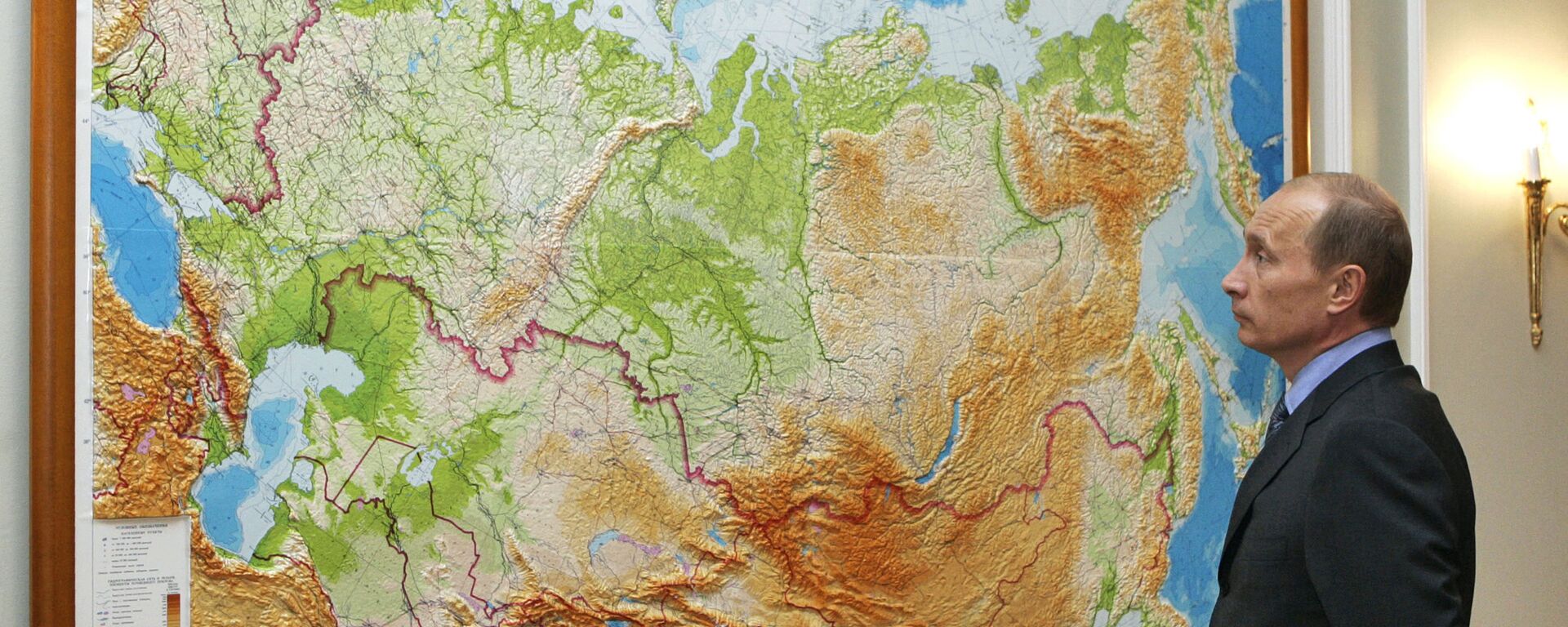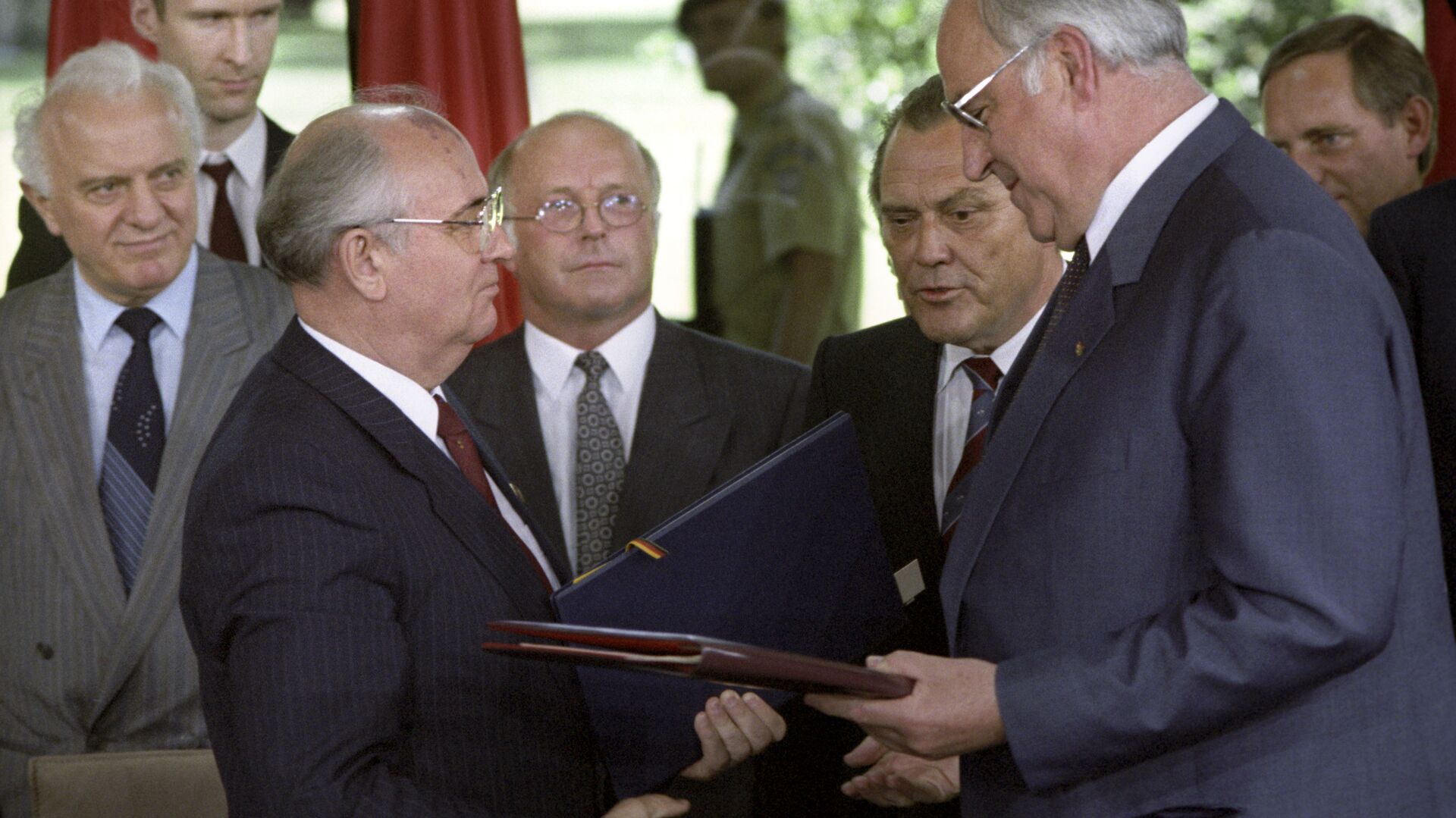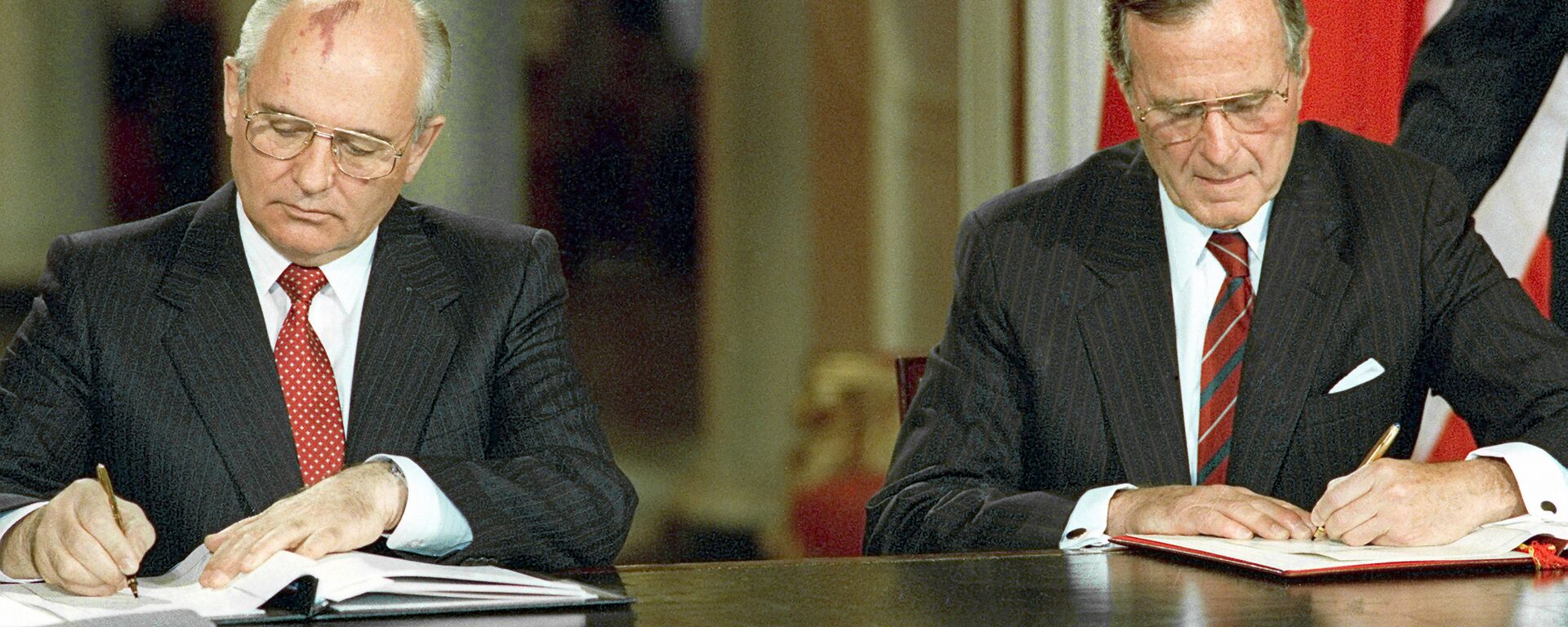https://sputnikglobe.com/20220210/ex-aide-to-kohl-reveals-what-he-said-when-gorbachev-questioned-germanys-need-for-nato-membership-1092917193.html
Ex-Aide to Kohl Reveals What He Said When Gorbachev Questioned Germany’s Need for NATO Membership
Ex-Aide to Kohl Reveals What He Said When Gorbachev Questioned Germany’s Need for NATO Membership
Sputnik International
In February 1990, US Secretary of State James Baker famously promised the Soviet Union that NATO would not move “one inch eastward” of a reunified Germany... 10.02.2022, Sputnik International
2022-02-10T16:15+0000
2022-02-10T16:15+0000
2022-02-11T11:57+0000
mikhail gorbachev
helmut kohl
https://cdn1.img.sputnikglobe.com/img/07e4/0a/03/1080653539_0:156:3087:1892_1920x0_80_0_0_96bdd3d139ac29114b3c6e43cf52ad92.jpg
In 1990, Soviet leader Mikhail Gorbachev queried the West German leadership about a future reunified Germany’s status in NATO, with Bonn offering an clever response, Horst Teltschik, a former advisor to West German Chancellor Helmut Kohl has revealed.“It seems to me that the Russian leadership fears that NATO’s eastward expansion will be directed against the Russian Federation. In this context, I am reminded of a confidential conversation I had with President Mikhail Gorbachev in early May 1990 on behalf of Chancellor Helmut Kohl,” Teltschik told Sputnik in an interview.Judging by the events which followed, Gorbachev did not question Bonn’s logic, and acceded to West Germany’s annexation of Soviet-allied East Germany in October 1990 with the Federal Republic’s NATO status intact.During talks on German reunification, James Baker, George H.W. Bush’s secretary of state, famously talked Moscow out of the need for a neutral Germany. “If Germany is neutral it does not mean it will not be militaristic. Quite the opposite, it could very well decide to create its own nuclear potential instead of relying on American nuclear deterrent forces. All our Western European allies and a number of East European countries have made it known to us that they would like the United States to keep its military presence in Europe,” Baker told his Soviet counterpart Eduard Shevardnadze in February 1990.Characterizing NATO as a “mechanism for securing the US presence in Europe,” Baker promised that “if the United States keeps its presence in Germany within the framework of NATO, not an inch of NATO’s present military will spread in an eastern direction” after the country’s reunification.In the three-plus decades since those discussions, NATO has incorporated all six countries of the former Soviet-led Warsaw Pact alliance, plus three former Soviet republics, Albania and four republics of the former Yugoslavia.In his home country, Gorbachev has received immense criticism for his laissez-faire approach to German reunification, particularly over the lack of written guarantees from the West not to continue NATO expansion. Former Soviet ambassador to Germany Valentin Falin would later recall that Gorbachev requested only 4.5 billion deutschmarks from Bonne for the withdrawal of Soviet troops from eastern Germany, despite upwards of one trillion deutschmarks’ worth of Soviet infrastructure built in the country. US troops never left the country after the Soviet withdrawal and disintegration, and remain stationed in Germany to this day.Last year, Gorbachev told Sputnik in an interview that he believed the United States had been struck by a sense of arrogance after the Soviet collapse. “They were struck by arrogance and self-confidence. They declared victory in the Cold War, even though we pulled the world out of confrontation – out of a nuclear race, together. But no, the ‘winners’ decided to build a new empire. It was from this that the idea of expanding NATO came,” Gorbachev said.
https://sputnikglobe.com/20210530/how-story-of-broken-nato-non-enlargement-pledge-upends-wests-effort-to-depict-russia-as-aggressor-1083035472.html
https://sputnikglobe.com/20211226/putin-on-red-lines-west-has-pinned-russia-into-a-position-where-it-has-nowhere-to-fall-back-to-1091813306.html
Sputnik International
feedback@sputniknews.com
+74956456601
MIA „Rossiya Segodnya“
2022
News
en_EN
Sputnik International
feedback@sputniknews.com
+74956456601
MIA „Rossiya Segodnya“
Sputnik International
feedback@sputniknews.com
+74956456601
MIA „Rossiya Segodnya“
mikhail gorbachev, helmut kohl
mikhail gorbachev, helmut kohl
Ex-Aide to Kohl Reveals What He Said When Gorbachev Questioned Germany’s Need for NATO Membership
16:15 GMT 10.02.2022 (Updated: 11:57 GMT 11.02.2022) In February 1990, US Secretary of State James Baker famously promised the Soviet Union that NATO would not move “one inch eastward” of a reunified Germany. Three decades later, the Western bloc has swallowed up more than a dozen countries in Eastern Europe, and rejected a Russian request for a halt to its expansion.
In 1990, Soviet leader Mikhail Gorbachev queried the West German leadership about a future reunified Germany’s status in NATO, with Bonn offering an clever response, Horst Teltschik, a former advisor to West German Chancellor Helmut Kohl has revealed.
“It seems to me that the Russian leadership fears that NATO’s eastward expansion will be directed against the Russian Federation. In this context, I am reminded of a confidential conversation I had with President Mikhail Gorbachev in early May 1990 on behalf of Chancellor Helmut Kohl,” Teltschik told Sputnik in an interview.
“Gorbachev asked me why Germany still needs NATO, since now we would be partners and friends. I told him that this may be true if we became friends and partners. But he must take into account that a unified Germany will be the largest country in the heart of Europe in terms of population and economy, surrounded by nine neighbouring countries including Poland, Czechoslovakia, the Netherlands, France, etc. Taking into account their history and experiences with Germany, it would be better for these countries to coexist with us if we were in the same alliance. Therefore, we need NATO for our own sake,” Teltschik said, recalling the discussion.
Judging by the events which followed, Gorbachev did not question Bonn’s logic, and acceded to West Germany’s annexation of Soviet-allied East Germany in October 1990 with the Federal Republic’s NATO status intact.
During talks on German reunification, James Baker, George H.W. Bush’s secretary of state, famously talked Moscow out of the need for a neutral Germany. “If Germany is neutral it does not mean it will not be militaristic. Quite the opposite, it could very well decide to create its own nuclear potential instead of relying on American nuclear deterrent forces. All our Western European allies and a number of East European countries have made it known to us that they would like the United States to keep its military presence in Europe,” Baker told his Soviet counterpart Eduard Shevardnadze in February 1990.
Characterizing NATO as a “mechanism for securing the US presence in Europe,” Baker
promised that “if the United States keeps its presence in Germany within the framework of NATO, not an inch of NATO’s present military will spread in an eastern direction” after the country’s reunification.
In the three-plus decades since those discussions, NATO has incorporated all six countries of the former Soviet-led Warsaw Pact alliance, plus three former Soviet republics, Albania and four republics of the former Yugoslavia.
In his home country, Gorbachev has received immense criticism for his laissez-faire approach to German reunification, particularly over the lack of written guarantees from the West not to continue NATO expansion. Former Soviet ambassador to Germany Valentin Falin
would later recall that Gorbachev requested only 4.5 billion deutschmarks from Bonne for the withdrawal of Soviet troops from eastern Germany, despite upwards of one trillion deutschmarks’ worth of Soviet infrastructure built in the country. US troops never left the country after the Soviet withdrawal and disintegration, and remain stationed in Germany to this day.
Last year, Gorbachev told Sputnik in an interview that he believed the United States had been struck by a sense of arrogance after the Soviet collapse. “They were struck by arrogance and self-confidence. They declared victory in the Cold War, even though we pulled the world out of confrontation – out of a nuclear race, together. But no, the ‘winners’ decided to build a new empire. It was from this that the idea of expanding NATO came,” Gorbachev said.

26 December 2021, 12:01 GMT



